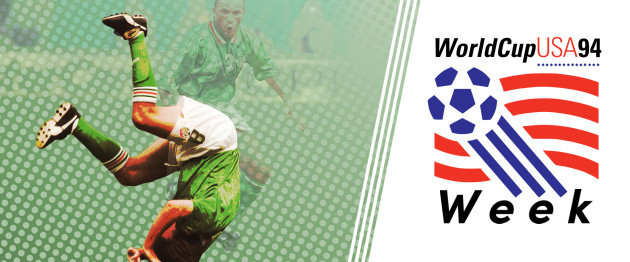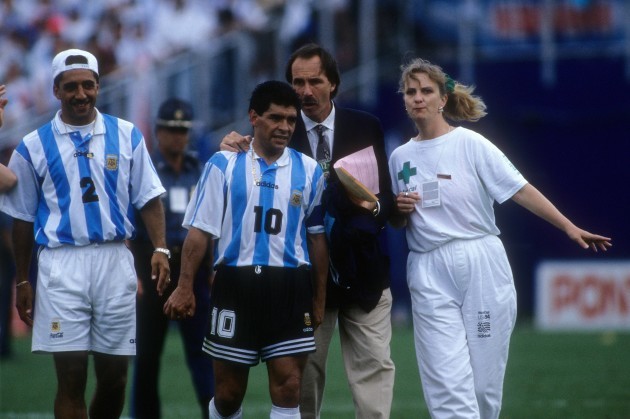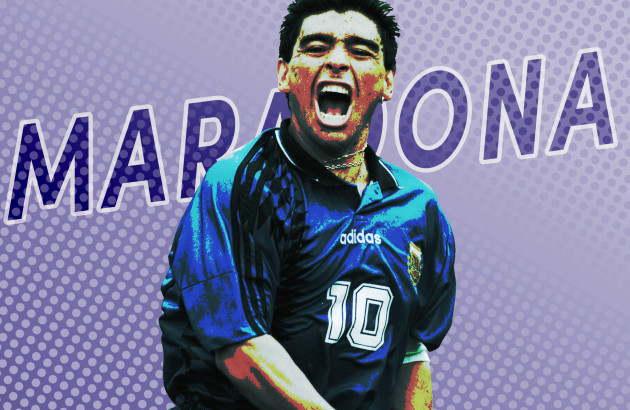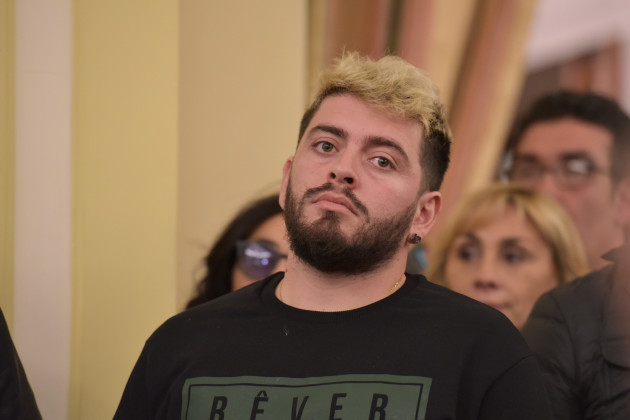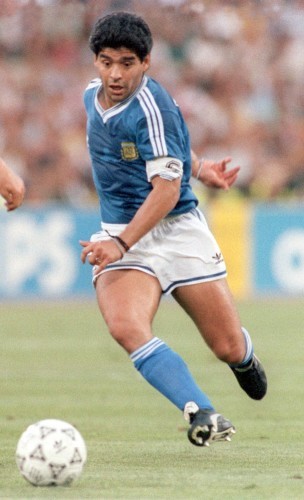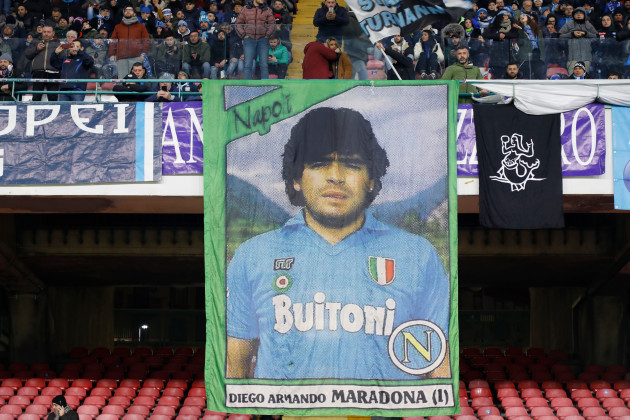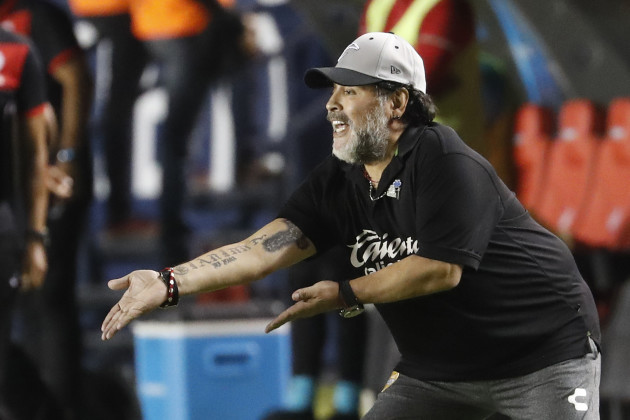This article is a part of The42′s USA 94 Week, a special series of commemorative features to celebrate the 25th anniversary of the 1994 Fifa World Cup. To read more from the series, click here >
THE 1994 WORLD Cup featured several iconic images and the one that stands out most probably varies depending on where you come from.
For Irish fans, it is Ray Houghton’s celebratory tumble and look of astonishment after he has scored the opening goal against Italy. For Italy fans, it is undoubtedly Roberto Baggio’s penalty miss against Brazil and the resignation in his eyes in that moment, having done so much to get Italy to the final.
And for Argentina supporters, it is surely Diego Maradona smiling sheepishly after being escorted away by officials after the Nigeria match (see above) — his last-ever game in international football. Having begun the World Cup by scoring a thunderbolt in an easy 4-0 win over Greece, it would later be confirmed that he was being sent home from the competition in disgrace after failing a drugs test.
It was not the last time Maradona played football professionally — he returned to Boca Juniors in 1995, scoring seven goals in 30 appearances, before quitting in 1997.
Really though, his decline can be traced back to many years previously. The time he spent at Napoli, between 1984 and 1991, is widely regarded as the Argentine legend’s peak. After leaving the Italian club at the age of 31 — the same age modern Argentine great Lionel Messi is now — he was never the same player again.
A new film by Asif Kapadia focuses predominantly on those years in Naples, suggesting they explain his life in microcosm.
Kapadia previously made two acclaimed documentaries, focusing respectively on the lives of the Formula One driver Ayrton Senna and the musician Amy Winehouse. Both those figures had similarly prodigious abilities, though they ultimately died tragically at a young age, whereas a 58-year-old Maradona remains very much alive, despite the turbulent life he has experienced.
The documentaries in question have been described as a “trilogy,” though Kapadia suggests the idea was not as pronounced as that phrase suggests.
I didn’t think going in that there would be so many parallels,” he tells The42. “My producer had a line that ‘Diego Maradona is like the child of Senna and Amy almost,’ and I guess that becomes apparent. He’s part great Latin American sporting hero, but he also has issues with himself, with people around him and with addiction. He’s got this gift and talent from a very young age like both of Senna and Amy.
“But then he’s Maradona. He’s got his own set of rules. No one really tells him what to do. The interesting thing and the challenge is that he grows up and he gets old and he’s still going and never ever retired peacefully and got a pub in Ireland. He just keeps going and creates chaos. Everyone else would be like: ‘Just chill.’
“He was in Mexico and before that he was in Belarus just trying to work. I think he’s trying to keep himself busy. That idea of a story that keeps going and going and going is difficult, but I like the challenge of it.
“And I guess I’m older now. I’m a different guy to the person that made Senna and Amy. I’ve got family and kids. You’re dealing with what happens to you and you’re thinking about your own life more — I guess I am. I was maybe interested in the challenge of what happens when you get old and you’re a sportsman and you’ve lost that gift. All that remains is the myth.”
The film presents its star as a conflicted individual with two versions of himself — ‘Diego’ and ‘Maradona,’ with the former being the kind, loving kid from Buenos Aires and the latter being the fatuous showman afflicted by all of fame’s excesses yet beloved by millions. In the documentary, Fernando Signorini, the player’s personal trainer, explains: “For Diego, I would go to the end of the world… But with Maradona, I wouldn’t take a step.”
Many people might look at Maradona and see his flaws simply as a natural extension of footballing genius — the supposedly inevitable price you must pay for greatness. Yet Kapadia plays down this notion.
“I think it’s more to do with where he’s from, coming from real poverty, a really tough background. The reason I call him a child genius is that if you’re a kid and you’re brilliant at something and you’ve become the breadwinner, you’re taken away from your families. That is the thing that affects you. It’s leaving home. The minute he makes some money, he’s got a fur coat, he’s got watches — got to have a watch, got to have a coat, it’s that thing that people with new money that have earned it quickly have to show it off, because they’re not sure of their worth. That’s really the thing for him and on top of that, he’s brilliant at something.
“In terms of the genius side, I don’t know any athlete or footballer that in 1981 or ’82 decides to have his own personal trainer just for him, because he knows he’s different, he knows he’s better, his body’s different, so Signorini, this guy comes along and just trains him, even though he’s in a team sport. I’ve never heard of that before, and he’s stuck with him for his life.
The team would be training at the pitch, and when you see [Maradona] on the running machine, that’s in his house. So he’s doing his personal training at home. He didn’t go to the stadium to do it. This is all part of his particular character — a lot of that goes back to where he’s from.”
The film is also the story of Maradona’s relationship with the city of Naples, after he joined Napoli for a then-world-record fee of £6.9 million. And having inspired the club that had previously never won the league to two Serie A titles, he is treated like a God there. It helps that there are parallels between its people — who are taunted by rivals fans and essentially regarded as ‘the lowest of the low’ in Italy — and Maradona, given his own humble, impoverished background.
“[Naples is] a character, it’s his lover and his rival, it’s everything. It’s a very unique place — a brilliant, unusual, wonderful place. But it’s chaotic, it’s in your face, it’s full-on, it’s smelly, it’s beautiful, it’s perfect for him, because in a way, the people are very much street people and he’s from the street in Buenos Aires.
“I think his mum’s side of the family are Italian. He’s kind of considered dark-skinned in Argentina and they’re dark-skinned in Italy, they’re not from the power bases. They’re on the margins and no one cares about them. That’s a really interesting link that comes between them.
“Naples only has one football team. Everyone supports them. There’s no rivalry — men, women, young, old, court judges, heads of the police, the army and the gangsters are all Napoli fans and they all used to go to the stadium. They’re all sat next to each other.”
The situation starts to go awry when links between Maradona and the local Camorra crime syndicate become apparent, and he enters into a world of drugs, prostitution and other unsavoury habits. Was Naples, therefore, the source of his downfall? Would it have been much different if, for instance, he had decided to go to Manchester United, or another high-profile club, in 1984?
“I don’t think it’s just the place. He can go anywhere and he’ll pick a fight. He could pick a fight in a paper bag. Wherever he is, he needs to have an argument, because of something in him. Having done loads of research, it was ‘maybe it’s this or that person’s fault’.
His family were really great and loving. It’s not that. He’s got sisters who loved him, adored him. It’s not that. He had a girlfriend and children, he had that. It’s not this coach, or that coach. He had a fight with every coach. So it was him. That’s why that whole idea of ‘Diego’ versus ‘Maradona’ is him, it always was. Why? It goes back to where he’s from and that when he was living in that shanty town, no one gave a shit. The minute he becomes famous, everyone cares what he’s doing. It’s the idea of: ‘I don’t want anyone judging me or telling me what to do. I do what I want to do. I’m Maradona.’”
As is often the case with passionate love affairs, Maradona’s relationship with the city of Naples ultimately turns sour. While it is a complex situation, Kapadia believes one particular issue is key in understanding the star’s downfall. Despite being married at the time, Maradona had an affair with local woman Cristiana Sinagra. As a result, Diego Sinagra is born, though the famous footballer rejects his former lover’s claims that the baby is his son.
Maradona even refused to undergo DNA tests, while in 1993, Italian courts ruled that Sinagra was his child. The pair met for the first time in 2003, during a golf tournament in Fiuggi, but it was not until 2016 that Maradona finally publicly recognised Sinagra as his son.
“I don’t come at these films by reading books and things, I look at the footage,” says Kapadia. “There was an absolute moment where the light goes from his eyes. It’s at the point where you must think he’s at his happiest, he’s just won the World Cup [in 1986], he’s the best player in the world.
“I’m not interested in gossip shows or magazines, I’ve got no interest in his private life. But in this one [instance], it mattered. That relationship was key, the timing of that relationship.
“He went into the World Cup knowing [Cristiana] was pregnant. [He said] ‘Oh, absolute shock, I don’t know who this woman was.’ The people around him, Signorini says, knew. The people around him talked about it. So it was even more amazing to go to the World Cup, knowing his life’s a mess. ‘When you’re on the pitch, life goes away.’ That line in the beginning and at the ending [of the film].
He creates chaos and problems off the pitch. The problem is the game ends and you’ve got to deal with your mess. My feeling is he absolutely wanted a child, he wanted a son, he has a son, he denied that son. That’s not good for him, it’s not good for the kid, it’s not good for his relationships, so he starts to lie, and the lie builds and builds.
“You can’t ever show weakness [in traditional Argentine culture], Maradona’s never wrong, therefore, I think that’s where his problems with addiction begin. I’m not saying he didn’t try stuff before, but that’s when they become a problem, when he’s hiding the problem. That’s what we’re left with. I think that was a big talking point.
“And it’s tragic, the idea of having a child and losing 30 years with that child. That’s when you’re like, I don’t know what person can do that. Why would you do that? You’ve got to be in a bad place to do that.
“Also, if you look at it, in Latin American families, and in Naples in particular, family and children, that’s a big thing. If you say: ‘I’m one of you, this is my family, my home, but when I have a kid with one of you, I’m going to deny it.’ You can see why that becomes a problem. He’s got a Neapolitan kid and he denies it.”
And while the relationship (or lack thereof) with his son appears to be at the heart of Maradona’s major problems, the aftermath of the 1990 World Cup feels like a career death knell of sorts. The whole of Italy seems to turn against Maradona after the star helps Argentina knock the host country out of the competition, at the semi-final stage, scoring the winning penalty in a shootout at Stadio San Paolo, Naples, of all places.
Not long after the tournament, Maradona tests positive for cocaine and receives a 15-month ban from football, subsequently leaving Napoli in disgrace.
“I think that’s the end of it. I think for himself, the problems start with the kid and all the other stuff that’s going on. But when the protection that he has [goes from the Italian authorities]… Everybody knew what was going on, nobody talked about it.
Even though you’re in a country of paparazzi, we looked everywhere, [you think] there are lots of photos of him coming out of clubs or coming out of bars and strip clubs — it doesn’t exist. There must have been photographers and journalists out there, there must have been people in the room. No one talked about it.
“And suddenly, it kicked off after that World Cup. Even Italians were like: ‘God, I never saw that headline [coming].’ It’s mad, the things they started saying about him. And they went for him hard. They went for him legally, getting done for things that he’s been doing all the time.
“Some of it’s perhaps bad luck — there’s an investigation going on with the underworld and his name starts popping up. His name may have popped up previously, but no one talked about it in the open. But at that point, suddenly it was out in the open and they went for him. You tell me why it was at that moment? It was time for him to go then.
“I actually think it probably saved him, getting out of there — he wanted to get out of there, he knew he needed to get out of there. They didn’t let him. When he did go, he did a runner. I think it was probably the best thing for him to get away.”
After leaving Napoli, Maradona undergoes a series of metaphoric deaths and rebirths. He plays rather fleetingly for Sevilla, Newell’s Old Boys and Boca, in addition to representing Argentina at the World Cup for one last time. But really, the embattled player is a shadow of his former self, despite continuing to show glimpses of brilliance.
“’94 [at the World Cup] was in the film at one point and that’s a big one for Argentina, because they thought they were win it and they thought the whole world conspired to ban Diego Maradona. But even when I talked to his trainer, his trainer said the guy that he hired had been training weightlifters and a number of weightlifters [had received drugs bans].
You bring someone out on your team, even though it may well have been a mistake somewhere, he was still an addict going into the World Cup. He temporarily was trying to clean himself up, but by then he’d burned so many bridges, they were looking for any excuse to take him down.
“It’s the same thing, just another version of what happened in Naples. It’s just the same cycle, but a different location. That cycle of he’ll do something brilliant, then it all goes a bit wrong, it becomes a disaster, his career’s ‘over,’ oh he’s back again somewhere else. That’s his life.
“He kept making comebacks, but I don’t think there was anything of any significance. He never finished a tournament or season after he left Naples. He never fulfilled a contract.
“He’s not really a footballer [at that point], so for me, we started to focus on a period when he became the best footballer in the world and he started to lose it, and all the problems began. Everything else is like a coda upon a coda upon a coda, which is still going.”
While he is no longer obsessed over to quite the same extent, Maradona remains regularly in the public eye to this day. At last year’s World Cup, his wild and sometimes inappropriate behaviour in the crowd during matches created headlines. He has yet to enjoy any real success as a manager, having taken charge of six different teams, most notably coaching the Argentina national side between 2008 and 2010, overseeing their progress to the quarter-finals of the World Cup before an emphatic 4-0 loss to Germany led to his acrimonious departure. He most recently stepped down after less than a year in charge of Mexican side Dorados, citing ill health as the reason for his departure.
Kapadia met and interviewed the man himself during the making of the film, and once the arduous process of actually getting hold of him was completed, found him to be pleasant company.
“He has a lot of people around him. But once you meet him, he is a charming guy. But like a lot of famous people, and particularly athletes, it’s the management and the team and the lawyers [that cause complications].
The complicated thing was the logistics. I’m in London. Maradona is living in Dubai. His lawyer is in Buenos Aires. I never had any direct contact with Diego, or even his lawyer. His lawyer had a person who worked for him and I don’t speak Spanish. So I spoke to my Spanish translator. She speaks to the woman, who speaks to the lawyer. That’s just the nature of the beast.
“Once we get into his house, he was charming, really nice and friendly, but he has his good days and bad days. If you get him on a good day, that’s what you hear in the film.
“Also, I didn’t want him performing. I didn’t bring a big camera, or a crew. I didn’t want to follow him around. I wanted to go where it’s calm and peaceful, so he’d be sat on the sofa chatting with a microphone and a table.
“I wanted to do it in a way where we’re just talking, there’s no pressure on you, you don’t have to put on a show and be controversial. I just wanted him to remember and think about his life and talk about it — talk about things in a way he hasn’t talked about them before and in our interview, he says a lot of things I’ve never seen him say to anyone before or after.”
But perhaps the biggest challenge the film faces is getting the audience to care for a character whose behaviour is appalling at times. Does Kapadia feel he succeeded in this aim? Is there a sense of redemption ultimately, as Maradona finally acknowledges his son towards the end of the documentary?
I hope so,” he says. “All I’d say is that people who’ve seen it so far have a bit more empathy, or feel sorry for him, in a way that they didn’t before. Even hardcore England fans going on about the ['Hand of God'] World Cup. They see the film and go: ‘You wouldn’t want that life.’
“Today, everything’s changed. You can’t excuse the things he’s done. All you can say is: ‘Why did he do the things he did?’ And it’s because of where he’s from and what he went through and where he was — that place he played at that particular moment in time. But I don’t think it’s going to become universal love. Even Argentinians that I’ve met — they don’t say it loudly: ‘I think [his behaviour is] quite an embarrassment to the country.’ People see it and say: ‘God, I didn’t realise how good he was. He was great. And he did amazing things. But he couldn’t control the situation.’”
‘Diego Maradona’ is in Irish cinemas now.
The42 is on Instagram! Tap the button below on your phone to follow us!
